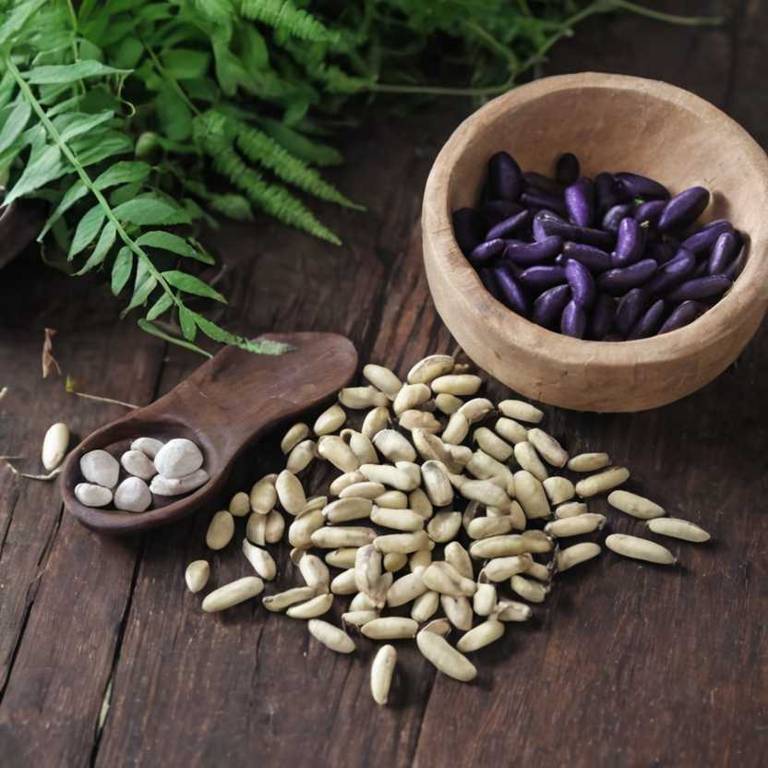Velvet Bean (Mucuna pruriens)
Velvet Bean (Mucuna pruriens) is a member of the Fabaceae family, native to India, Southeast Asia, and Africa. Traditionally, its seeds, leaves, and bark have been used for decoctions, powders, and infusions.
This herb is particularly valued for its tonic, stimulant, and anti-inflammatory actions, and has a long history of use in ayurvedic medicine, african traditional medicine, and traditional chinese medicine.

Quick Facts / Key Information
| Common Name | Velvet Bean |
|---|---|
| Scientific Name | Mucuna pruriens |
| Plant Family | Fabaceae |
| Genus | Mucuna |
| Species | pruriens |
| Native Range | India, Southeast Asia, Africa |
| Plant Parts Used | Seeds, Leaves, Bark |
| Primary Medicinal Actions | Tonic, Stimulant, Anti-Inflammatory |
| Primary Traditional Systems | Ayurvedic Medicine, African Traditional Medicine, Traditional Chinese Medicine |
| Historical Preparation Methods | Decoction, Powder, Infusion |
Botanical Identity
- Scientific Name
- Mucuna pruriens
- Common Name
- Velvet Bean
- Synonyms / Alternative Names
- Cow-Itch, Sundial Bean, Mucuna
- Plant Family
- Fabaceae
- Genus
- Mucuna
Botanical Description
- Growth Habit
- Perennial herbaceous plant.
- Height
- It typically grows to a height of 2 to 5 meters.
- Leaves
- Pinnately compound leaves with stipules, upper surface glabrous and green, lower surface pubescent and pale green.
- Flowers
- Inflorescences are racemose with zygomorphic flowers having five petals, one of which is spurred, and stamens arranged in two whorls with filaments fused to the petals.
- Stems
- Climbing, hairy, and twining, with opposite branching and a distinctive, ridged, and pubescent surface.
Traditional Uses / Historical Use
Traditional Systems
- Ayurvedic Medicine
- African Traditional Medicine
- Traditional Chinese Medicine
Historical Preparation Methods
- Decoction
- Powder
- Infusion
- Poultice
Medicinal Actions
- Tonic
- Traditionally described as a gentle tonic, in whole-system applications.
- Stimulant
- In herbal literature, noted as a cooling stimulant, for vitality-related discussions.
- Anti-inflammatory
- Historically regarded as a soothing anti-inflammatory, for irritation-related applications.
- Antispasmodic
- In herbal texts, considered a calming antispasmodic, in smooth muscle contexts.
Active Compounds
- Alkaloid
- A class of nitrogen-containing compounds produced by many plant species.
- Flavonoid
- Naturally occurring polyphenols that contribute to pigmentation and structural chemistry.
- Glycoside
- Secondary metabolites formed through glycosylation processes in plants.
- Saponin
- A group of glycosidic compounds commonly found in roots, leaves, and seeds.
Modern Research Overview
This section is reserved for future summaries of scientific research related to this plant. As additional verified sources are reviewed, relevant study information will be added here.
Safety & Contraindications
- General Precautions
- Precautionary considerations have been reported in relation to this herb.
- Contraindications
- The use of this herb has been associated with reported contraindications in some situations.
- Allergies
- Reports of allergic reactions to this herb are not well documented in available sources.
- Drug Interactions
- The potential for interactions with prescription medications has not been extensively studied.
- Toxicity
- Toxic effects have been reported in association with the use of this herb.
- Pregnancy & Breastfeeding
- Available information regarding use during pregnancy or breastfeeding is limited.
Preparation & Usage Methods
- Infusion
- A preparation method involving steeping plant material in heated water for a short period.
- Decoction
- Plant parts are gently boiled in water to release soluble constituents.
- Poultice
- Poultices involve external application of prepared plant matter.
- Powder
- Plant parts are dried and mechanically reduced to a powdered form.
- Tincture
- A preparation involving soaking plant parts in alcohol for extended extraction.
Growing, Harvesting & Storage
Growing / Cultivation
- Soil
- Prefers loamy soil with well-drained conditions. Typically grows best in organically rich soils.
- Sunlight
- Thrives in full sun. Tolerates full sun to partial shade.
- Watering
- Prefers well-balanced moisture levels. Tolerates variable moisture levels.
Medical Disclaimer
The information provided on this page is for educational and informational purposes only. It is not intended to diagnose, treat, cure, or prevent any medical condition. Always consult a qualified healthcare professional before using any herb for medicinal purposes.